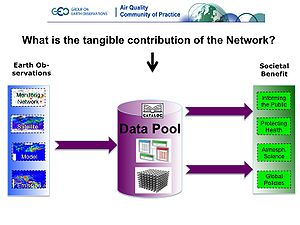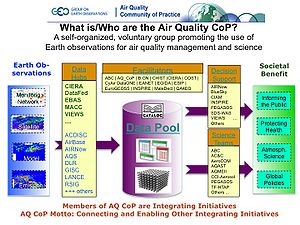Solta 2011 Agenda
< Back to ![]() | Workshops | Air Quality Data Network
| Workshops | Air Quality Data Network
Monday 16:00-18:00: Data Catalog Side Meeting (everyone welcome)
GI-cat - ESSI Federated Catalog (aka EuroGEOSS Discovery Broker, part of GEOSS Common Infrastructure)
AQComCat - Air Quality Community Catalog
GI-cat-AQComCat link - Federating AQComCat into GI-cat; Accessing GI-cat from AQComCat
Monday 18:00-19:00 Social
Tue 08.00-10.00: Self-Introduction, 5 mins/participant
Welcome
Logistics
Agenda and Procedures
- Daily 8:00-12:30; 16:00-19:00; Coffee break and 18:-19:00 (1.5 h) informal interaction
- Total of ten two-hour sessions.
- First half focused on data server, catalog software
- Second half on more general AQ data networking
- Two rapporteurs for each session
Self-Introduction - by each participant
- Slides 1-2: Name, institution, relevant research (on interoperability, networking), participation in major projects/programs
- Slide(s) 3-(4): What would you like to take away from the workshop; what would you like to offer to the workshop (or AQ CoP)
Tue 10.30-12.30: Introduction of Hubs, 5 min each
Intro of AQ Data Hubs - by their representatives
- AQ Community Servers: Common DataFed, FJ Juelich, NGC/CIERA, EBAS
- Other Servers: DLR/ACP, AIRNow, EEA NRT, AQMEII (AeroCom, RSIG, GIOVANNI)
Air Quality Community of Practice (AQ CoP) - R Husar
Air Quality Community Data Server - M. Schultz
Tue 16.00-18.00: IT Breakout: AQ Community server software
Use of netCDF and other data formats
Gridded data service through WCS
Station-point data service (SQL)
Data server performance issues/solutions; Server co-development tools
Relationship to other WCS servers; Real Data-to-WCS/WFS/WMS-Mapping
Tue 16.00-18.00: Scope and Type of Data to be Served
- Ensemble System (JRC) Presentation from Stefano Galmarini on AQMEII and ENSEMBLE (Data Hub/Facilitator)
- Witten in Perl and IDL
- Comparisons and evaluation of models
- Coordinated model harmonization across 27 models
- Also a reposition for the dissemination of model and AQ measurements
- Produced 4-page tech spec docs that were sent to groups for supplying data; this was key step in making the process smother.
- Main features
- Transfer of very large model output across internet
- Storage of 1,2,3D model data
- Quick access of large dataset
- Distribution of KML and WMS (in progress)
- Use an ASCII format file to describe the model files
- Have a program call ENFORM (Fortran) that transforms model data into the compressed dataset (1.2GB → 200MB)
- Can produce GE projected files (nice)
- 11 papers came out in a special journal edition
- Data Versioning. Aasmund brought up the issue of versioning. He suggested that timestamp of submission of data is a useful versioning approach.
- Need additional flags on observation level
- GEO AQ CoP. R. Husar begun discussion on what the AQ Community of Practice is/does? CoP Intro PPT
- Pic of data pool - started discussion with the idea that CoP should only create distributed data pool and build the data network.
- Discussion w/in group thought this was too narrow and had issues with how the CoP differed from the facilitators.
- Reworded CoP purpose to CoP should "Connect and Enable" AQ data networks, hubs and facilitators so that they can connect and enable the data needed for their systems.
Data Providers: Existing data Data Hubs - how do they work?
Data Classes
- by data source-driver (mandated, research)
- by content/platform (emission, ambient, remsens, model)
- by space-time (global, regional)
Data Level
- Primary (original), Secondary, Mediated
- Raw , processed , how?
Tue 18.00-19.00: General Discussion, with wine and cheese
Wed 8.00-10.00: Breakout reports, general server items
What few things must be the same, so that everything else can be different?
Report from the IT breakout session: Community server software
Report from non IT breakout session: ADN scope, providers, users
Report from the pre-workshop Data Catalog side meeting
Crossover topics between IT and non-IT issues
Wed 10.30-12.30: Data network catalog and clients
Functionality of an Air Quality Data Network Catalog
Catalog content and structure (granularity) of ADNC?
Minimal metadata for discovery, data provenance, quality, access constrains?
Single AQ Catalog? Distributed? Service-oriented?, Access rights
Catalog Clients expand here
Wed 16.00-18.00: Relationship, cooperation, governance
3 call-in presentations, (10 mins each max!)
- 16:00 US EPA - Terry Keating (HTAP, CyAir..) ...perspective on AQ data networking;
- 16:10 Nat.Park Serv. - Bret Schichtel (VIEWS) on data collection & usage in VIEWS DSS -
- 16:20 GEO - UIC. Adam Carpenter on GEO Earth Observation Priorities
16:30-17:00 Discussion
17:00 - 18:00 User perspective, value chain.
Relationships, cross-thematic links (EGIDA, ESIP), How can we collaborate? Network governance
Wed 18.00-19.00: General Discussion, with wine and cheese
Thu 8.00-10.00: Networking impediments and opportunities
JJ Bogardi, Global Water System Project (GWSP) at EGIDA, Bonn:
Nature of Networking Projects: Complex funding; mixture of paid and voluntary; multiple obligations; international; differing project maturity; governance, cultures
Which glue keeps it together? Trust and personal affinity. Common objectives and scientific values. Mutual respect. Mutual benefit (win-win). Complementarity. Donor dictate
Lethal“ ingredients. Turf mentality. Budget discrepancies. Too much competition. Lack of data and information exchange. Donor jealousy
- Clear statements about obstacles: no clear structure; no dedicated funding and no clear idea(s) yet how to do it.
- Opportunities, fixes: ID manageable work packages; Find, organize, distribute reusable components, resources; Create win-win situation
Thu 10.30-12.30: ADN user relations/help, whom, what?
- Target User communities
- Use cases for different applications... from scientists to managers, media people and the general public)?
- How can users find out about (each) system? Big future issues: data quality, traceability, metadata..
Thu 16.00-18.00: Workshop outputs, outcomes, plans?
What are the anticipated outputs? Agreement on community WCS server for grid and point data; server governance, distributed catalog; workshop summary
What are the anticipated outcomes? More servers and data added to the shared data pool and more willing users of shared data.

